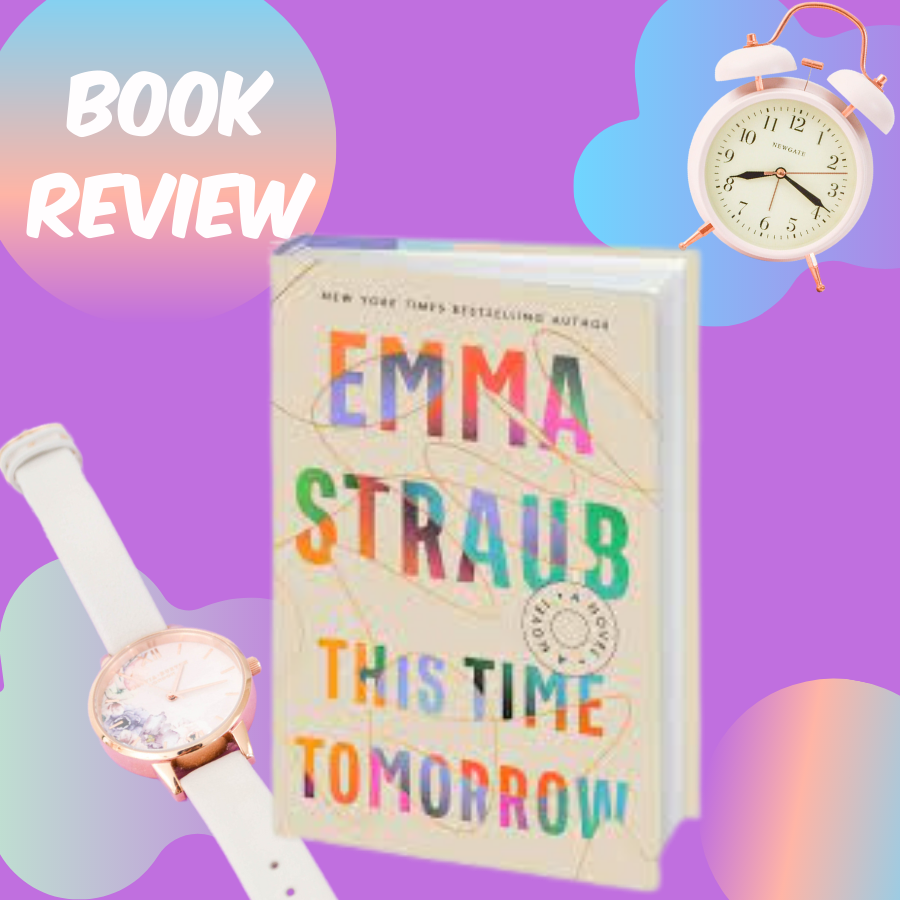At the start of Emma Straub’s newest book, This Time Tomorrow, Alice Stern is not unhappy with her life. She just isn’t sure whether it’s the one she would have chosen. There are minor spoilers in this review!
On the eve of her 40th birthday, Alice works in the admissions office of the upper class private school she attended as a child on New York City’s Upper West Side. She went to art school, but her dreams of being an artist have fizzled somewhere along the way. We see her refuse the proposal that her nice-enough boyfriend felt compelled to offer, to their mutual relief. And her father, Leonard Stern, a famous science fiction writer whose work focuses on a pair of time traveling brothers, is in a hospital bed near death.
But Alice embraces aspects of this. She has deep friendships and an equally deep love of New York. Some of my favorite moments in the book are when we see the city through her eyes. After she decides not to marry her boyfriend, she continues to eat her dessert happily, commenting at length about the texture of her pudding. Something might be missing, but it isn’t necessarily a husband.
“Alice had looked around and realized that while all of her friends from college had kids and couldn’t stay out late, or couldn’t sleep late, or could only meet her between the hours of 10:30 and 11:30 a.m, depending on someone else’s nap, she could still do whatever she wanted, whenever she wanted,” Straub writes. “She had come out the other side of jealousy. Alice was free to travel, free to go home with strangers, free to do anything.”
What Alice hasn’t made peace with is her father’s health. She is deep in her anticipatory grief. This Time Tomorrow does an excellent job of portraying this state–the magical thinking of it, and the guilt over wishing for its end. This is part of what leads her to his empty house on the night of her birthday, drunk and alone in the middle of the night without her keys. She ends up in the supply closet outside, which she discovers, upon waking, is a portal to the past–something her father must have known all along.
Alice wakes up in her 16-year-old body to the sound of him, young and vibrant in a way she had never remembered him being. Now, she has the chance to make the choices she didn’t make the first time around–to go for the guy, to spend more time with her dad, to make efforts to help him improve is health. She truly is able to live out the dream many of us have had when our parents are ailing–to go back, to do it differently, to simply have more time. Straub’s portrayal of this is so bittersweet. There is such great joy and so many revelations to be found for Alice in going back, but it is joy that most of us cannot access. And, even for Alice, it is joy that cannot last.
When she finds her way back to 40, after this first trip and each successive trip to the past, she must live in the wake of her new choices, finding that the new lives–even the one where she marries her high school sweetheart and has two perfect children–just don’t seem to fit her quite right, and that some things can’t be changed at all–no matter how hard she tries.
This Time Tomorrow manages to be many things at once. It offers a lot of fun reflection on time travel and the many ways it is portrayed in science fiction. It considers middle age and regret, and how even the smallest choices have lasting implications on our lives. It is also very much about Alice and her father, how her travels allow her to see him and appreciate all of him–past and present–and how seeing him so fully allows her to come to terms with her grief. It makes sense, somehow, that this process manages to happen at once over the course of days and decades. Grief exists on its own, separate timeline.
Alice’s travels also allow her a sense of agency she doesn’t seem to have at the book’s start. Her revisions to her own timeline force her to take action at times when she may have just coasted before, to end up in a life she has truly chosen. They allow her to see past regret for the lives she didn’t have and to live the one she does. There is so much that resonates here about reaching a point in life where the passing of time has seemed to close doors on things like motherhood, marriage, and career. Time travel allows Alice to see that there were other doors left to open all along. Living out many lives in quick succession condenses the kind of seismic shift in consciousness that would otherwise require years of introspection and self-work.
This Time Tomorrow is lighthearted for a book that takes on so much. Straub brings us along with Alice through her growth and her grief with humor and grace. The fantastic elements save Alice–and the reader–from the heavy psychological lifting it might have otherwise taken to reach what would be hard-earned conclusions about love and loss. Though it brought me to tears over and over again, it was a joy to read.
Want more? Check out this podcast episode with Mariquita & Emma themselves!


